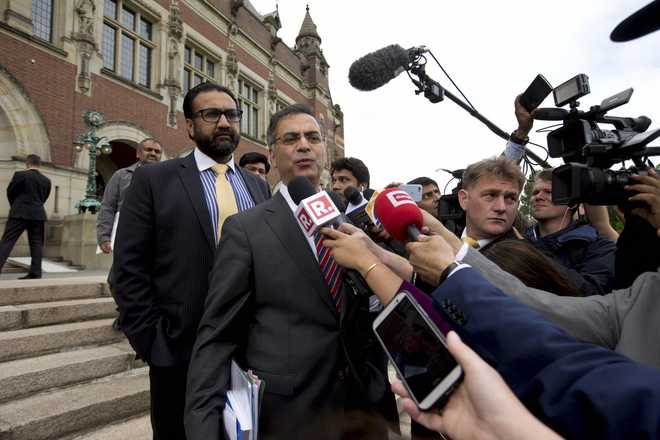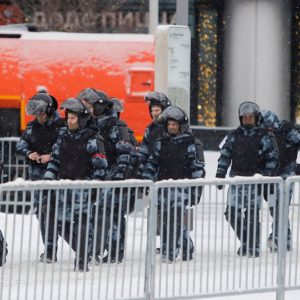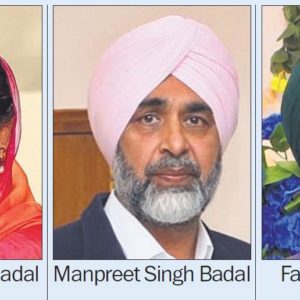Islamabad/The Hague, May 18
Pakistan does not accept the International Court of Justice’s jurisdiction in matters related to national security, its Foreign Office said on Thursday after the UN court stayed the execution of Indian national Kulbhushan Jadhav.
Foreign Office spokesman Nafees Zakaria also hit out at India, saying the country has been “trying to hide its real face” by taking the case of Jadhav to ICJ.
Jadhav, 46, was sentenced to death by a Pakistani military court and India approached the highest UN judicial body with the plea to stay his execution.
The Hague-based ICJ today instructed Pakistan to take all “necessary measures at its disposal” to ensure that Jadhav was not executed pending a final decision by it.
Pakistan was in shock as it was confident that the ICJ will throw out the case on the grounds of jurisdiction.
The head of Pakistan’s delegation at the International Court of Justice termed its order staying the execution of alleged Indian spy Kulbhushan Jadhav as a “basic ruling” and said the UN court had not mentioned anything about maintainability of the order.
Asked by reporters outside the ICJ if Pakistan will stay Jadhav’s execution as ordered by the court, Moazzam Ahmad Khan initially did not reply.
He then said the ruling was “basic”. He did not comment on the merits of the case.
“This is a very basic judgment. What the court has done is that it has given a ruling on provisional measures,” Khan told reporters.
“It did not say anything on the merit of maintainability of the order,” he said.
Talking to the state-run Pakistan Television after the ruling was delivered, Zakaria said India has been “trying to hide its real face” by taking the case of Jadhav to ICJ.
“The real face of India will be exposed before the world,” he said, adding that Jadhav has confessed his crimes of sabotage, terrorism and subversion activities not only once but twice.
He said Pakistan has already informed the ICJ that it does not accept its jurisdiction in matters related to the national security. “We do not accept the jurisdiction of the ICJ in matters related to the national security of the country,” he was quoted as saying by the Dunya TV.
However, he said Pakistan “will present solid evidence against the Indian spy in the International Court”.
Earlier, Zakaria said at the weekly press briefing said India was trying to portray Jadhav’s case “as a humanitarian issue to divert the world’s attention from his role in fomenting terrorism” inside Pakistan.
He said Pakistan’s position was clear as it was a matter of national security. He said Pakistan’s reply to ICJ was in line with Article 36 (2) of the Vienna Convention that Pakistan does not recognise the jurisdiction of the ICJ in this case.
Adviser to Prime Minister on Foreign Affairs Sartaj Aziz said issuing of stay by the ICJ in interim case of Jadhav is not something extraordinary.
He said courts sometimes grant such orders which do not have any bearing on long-term running of the case.
Aziz said it is wrong impression that the selection of counsel in the case was not appropriate.
He said the matter of consular access was not included in operational order of the court. “Our stance is that security reasons are also very important,” he added.
Information Minister Mariyum Aurangzeb said no compromise will be done on Pakistan’s nation security.
Commenting on the ICJ ruling, Pakistan’s Attorney General Ashtar Ausaf Ali’s Office said the ICJ’s decision has not changed the status of Jadhav’s case in any manner.
In a statement, it said in today’s interim order, ICJ has stated that by way of provisional measures, the status quo be maintained in the case of Commander Jadhav.
The court has clearly underscored that the provisional measures are without prejudice to the final determination of the merits and jurisdiction of the case.
The statement said the provisional measures are a procedural process only to enable the court to have full consideration at a later hearing. It said these measures have no bearing whatsoever on the final decision of the Court.
It said Pakistan attended the hearing out of its utmost respect for the court and pursuant to the established jurisprudence that the challenge to jurisdiction can be made via appearance and not by abstaining from the process.
In addition, Pakistan attended because of its conviction that the only way to resolve all outstanding issues is through peaceful means, the statement added.
“We are confident that India would not be able to hide the subversive activities it is trying to carry out through its agents like Jadhav,” it said.
‘Weak case’
Meanwhile, experts and the opposition leaders blasted ICJ order as failure of the Nawaz Sharif government to press the case properly.
“We based our case on jurisdiction and it proved weak.
More arguments should have been made regarding espionage,” Pakistan People’s Party leader Sherry Rehman said.
Justice (retd) Shaiq Usmani told DawnNews the decision is alarming because “ICJ does not have jurisdiction. It’s Pakistan’s mistake to have appeared there. They shouldn’t have attended. They have shot themselves in the foot.”
London-based Barrister Rashid Aslam said Pakistan was ill-prepared and did not utilise the 90 minutes it had to make its argument.




 Uber Cup badminton: India’s young women’s squad beats Canada 4-1
Uber Cup badminton: India’s young women’s squad beats Canada 4-1





























